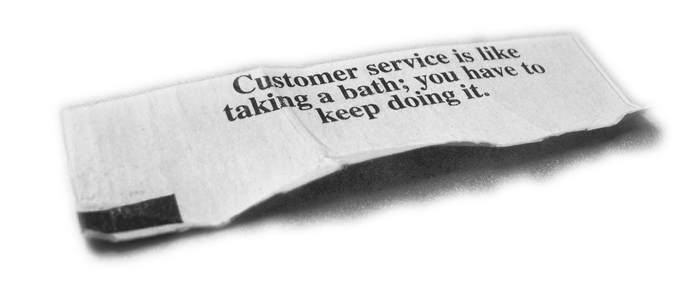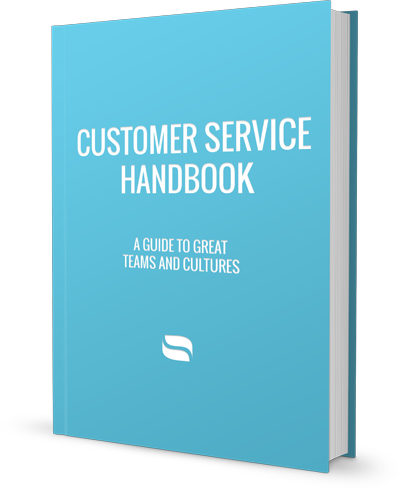







Customer Service Handbook: A Guide to Great Teams and Cultures
This is a part of a continuing series that is also available as a downloadable eBook here. We talked to 35 companies, including Stripe, Twilio, and Mailgun, to get a sense of what it takes to run a great customer support organization. While every company is different, there were some trends that we could identify as benchmarks for great customer support.
We've decided to catalogue our experiences and conversations into a book about what we care most about: making customers happy through customer support. Rather than releasing the book all at once, we've decided to publish it in chunks online (like this page) for ease of consumption.
We hope this book will help those of you on the path to building a company or those who are just genuinely interested in learning how to build great customer support teams and cultures. As a secondary objective, we hope this book will offer you new perspectives on the value of having an effective customer support team that meshes well with the rest of the company.
About Us
We're the small team that's behind Reamaze, a simple-to-use customer support tool designed for small businesses. Reamaze helps you have more meaningful and valuable conversations with your customers. Instead of complex ticket management, overkill analytics, bloated delivery systems, useless features, and 2-month learning curves, Reamaze focuses on simplified multi-channel support, meaningful metrics, streamlined collaborative features, and integrated CRM tools to help you build relationships with customers and deliver great support.
Our philosophy has always revolved around generating positive traction with customers. Today, everything we build revolves around the meaningful interactions we have with customers. We're adamant about running customer support ourselves with a highly personal and exposed visage of who we are and what we represent as a company. By having personal conversations with as many customers as we can, we've been able to build a moniker for always being there for everyone. We see higher conversion rates when we are able to have one-on-one conversations with customers to understand their troubles, issues, and needs. It also means the world to them when their feedback become tangible realities.
The more we know about customers the more confident we are during conversations. And the more conversations we have, the more customers enjoy our products. Complaints turn into feedback, issues become talking points, and no's become ultimate yes's. As good as all this sounds, is any of it scalable? Is our process reproducible? What are other thought-leading companies doing for customer support? How do we operationalize customer-centric cultures? Can we help other entrepreneurs and companies deliver awesome support experiences that truly add value to their bottom line?

From an actual fortune cookie
Why We're Writing This Book
There is a fundamental shift happening for businesses around the globe. Large businesses were dominant players in almost every facet of consumerism just two decades ago. Corporations invested heavily on their customer support operations in the name of efficiency and to cope with ever rising demand. Efficiency and mass producing customer support was, unfortunately, costly. This growing cost center eventually created a divide defined by impersonal call centers, robotic help-desks, and the dreaded ticketing concept. Companies forgot what it meant to understand customers and instead focused on how to decrease the cost associated to supporting each customer.
Today, startups and small businesses are burgeoning everywhere fueled by the transformative powers of technology and globalization. And while there will always be large businesses and corporations hedging the top tiers of any given industry, more businesses are opting for a smaller, tighter, and leaner operation to serve a more focused niche.
Jason @ Twilio
"The customer support landscape has changed quite a bit since the 90's. The technology we're working with today can vary quite a bit in shapes and sizes because we're no longer dealing with licenses or long-term subscriptions but more of a 'pay as you' payment framework. We've got people that are spending lots of money every month running entire call centers, and we've also got the weekend hackers and basement developers depending an entire business on Twilio. From the support perspective, it's catering to different kinds of customers that is most crucial."
Customers are back in control again. They no longer have to deal with sleazy call centers, “press 1 for support” robots, and outsourced support teams. They don't have to buy from you if they don't want to. Just two decades ago, it was perfectly appropriate to deliver customer support via mass distribution. Customers were okay with waiting on the phone, waiting for emails, and waiting for businesses in general. This is no longer true. The smaller, tighter, and leaner businesses of today will need to interface with customers more frequently through rapid iteration. The level of intelligence, intimacy, and finesse needed to deliver great customer support experiences are evolving as well. How will small businesses cope with this evolution? How will these evolutionary changes affect the nature of building a successful business? And what role should customer support play here?
Courtney @ Eventbrite
"We have a chance to make a strong connection with customers who we talk to actively. And that's what counts. We prioritize customer interactions and integrate it with our product roadmap. Having really great conversations will be valuable enough to ensure a customer stays with you. If customers don't feel the respect of their voice being heard then they will look for alternatives."
We want this book to help the next generation of small and medium sized businesses from technically savvy startups to hip mom-and-pop shops. We want to help them do customer support right.

The Right Fit
If you want to build brilliant customer support teams and cultures then this book is for you. Leave everything you think you know about customer support at the door, for now, because we want to show you how to build a customer support operation that is smarter, faster, and better in every way.
Whether you're a customer support manager, customer experience director, startup entrepreneur, or a small business owner, this book will help you cut through the noise and get down to what's really important: conversing with customers in an efficient and effective manner.
Does This Apply To You?
The fact you're reading this book means you've already realized the importance of customer support. You realize the old ways of the support center is long gone. The need to meet customers where they are has changed the playing field for competitiveness. Customer retention is ever more pressing in this recovering economy. You might be having a hard time seeing the right place to start or simply having trouble shaking that sleazy call center vibe. Or maybe you're not yet on board with customer support being all that valuable but are eager to see what others are doing.
We're not going to beat around the bush and try to shape customer support into something it's not. However dry and boring customer support may sound, it is a crucial part of running a successful business. When done right, a customer-centric business culture can be stupendously fun, amazingly rewarding, and incredibly valuable. We want to help you do it right.
- This customer service handbook is about seeing the problem with customer support and overcoming stereotypes.
- This customer service handbook is about focusing on people and conversations, staying relationship focused, and embracing adaptation.
- This customer service handbook is about setting expectations. Expectations ranging from customers to employees will define how cohesive your customer support team will be with the rest of the company.
- This customer service handbook is about how to maximize benefits and value from communicating with customers for your business.
- This customer service handbook is about identifying inevitabilities and making sacrifices. There are some things you cannot do without and there are some things you can. Learning to cope with either will help you scale.
- This customer service handbook is about your product.
- This customer service handbook is about team-building, brand-building, and culture-shaping.
- This customer service handbook is about delivering genuine awesomeness that is sustainable, efficient, and effective.
Strategies from this book will be applicable whether you run a “lone ranger” support operation or a power team of 20. Many of the ideas outlined here extend beyond just building customer support teams. Ideas about overcoming stereotypical processes, setting expectations, emphasizing consistency, team building, and transparency are all great subjects to read up on before you cast off into the sea of entrepreneurship.
About Them
Major portions of this book are contributed by the awesome people and companies dedicated to providing amazing customer experiences. We want to thank them for their time, knowledge, and friendship. Tidbits about them:
Eventbrite is an online service that people everywhere use to create, share, and join any event imaginable. Founded in 2006 by Kevin Hartz, Julia Hartz, and Renaud Visage, Eventbrite quickly gained popularity among event planners all across the world. Eventbrite is headquartered in San Francisco and has been selected as one of the best places to work in 2010 and 2011. It was also nominated for the 15th annual Webby Awards. Courtney Duhring is a Manager with the Client Services Team at Eventbrite.
Ideeli is an online retailer that offers limited-time sales of brand name products. Founded in 2007, ideeli is now ranked by Inc. as one of the fastest growing retailers in the United States with more than 6 million members and 1,000 brand partners. Ideeli is headquartered in New York City and now operates the entire 45th floor of the New York Times building. Jason Faria is the Director of Customer Service at ideeli.
Mailgun provides a web service for integrating email inboxes into web apps through a simple and intuitive API. Mailgun was part of the Winter 2010 Y Combinator (a Silicon Valley startup incubator) class and rapidly gained traction among developers. In August of 2012, Mailgun was successfully acquired by Rackspace to provide Rackspace hosting customers with cloud-integrated email services. Taylor Wakefield is the Co-Founder and Chief Operating Officer at Mailgun.
Oodle is an online shopping and marketplace provider based in San Mateo, California. Founded in 2005, Oodle operates a network of online marketplaces with more than 15 million monthly unique users and is considered the largest classifieds aggregator. Oodle powers entities such as Facebook Marketplace, ForRent.com, and aggregates classifieds for companies such as AOL and the New York Post. In December of 2012, Oodle was acquired by home shopping giant QVC to extend home shopping into the social realm. LLewellyn is the Director of Customer Service at Oodle.
Outright provides a simple online bookkeeping application for small businesses, entrepreneurs, and the self-employed. Founded in 2008, Outright is considered one of the most customer friendly apps for small business needs with over 200,000 customers. In July of 2012, Outright was acquired by GoDaddy to further help small businesses grow. The two companies are now committed to providing easy-to-use, affordable solutions for small businesses. Christie Strasia is the head of the Customer Care Team at Outright.
Stripe is one of the fastest growing startups based out of San Francisco, California focused on making accepting payments online easier. Stripe is backed by PayPal founders Peter Thiel and Elon Musk, as well as Sequoia Capital, Andreesen Horowitz, and SV Angel. When asked how Stripe is different from PayPal or other online payment platforms, Stripe answered: "It doesn't suck". Michael Schade is head of customer support at Stripe.
Twice is a startup in the online secondhand clothing space. Twice differentiates itself from competitors by being 100% focused on its concierge-style market place. Items sent in by Twice sellers are professionally evaluated, photographed, and marketed. Founded in 2011 by Noah Ready-Campbell and Calvin Young, Twice is rising in popularity and expanding its brand coverage at a rapid pace. Lauren Heminez is the face of Twice, a one-woman customer support operation. She is the community manager, the customer support superstar, and the friend you can always rely on.
Twilio provides a cloud communications solution that allows developers to make and receive phone calls and send and receive text messages through a web-based API. Founded in 2007 by Jeff Lawson, Evan Cooke, and John Wolthuis, Twilio has over 150,000 developers using its platform. Twilio was nominated for the "Dow Jones FASTech 50 Startups to Watch" list for 2010 and The Business Insider named Twilio as one of the "20 Hot Silicon Valley Startups You Need to Watch" in 2010. Jason Nassi is the Director of Customer Support at Twilio.
The Honest Truth
The ideas, thoughts, and strategies outlined in this book are not the only ways to go about setting up outstanding customer support teams and cultures. Take everything with a grain of salt as these are simply a condensation of things that have worked for us and our partners. We didn't write this book for it to be a one-size-fits-all because we're aware that every company has its own starting points and circumstances.
Will the strategies outlined in this book work for me?
We don't know. This book might be the perfect companion for those of you who are just starting to think about customer support and want to do it right from the get-go. On the other hand, if you're the manager of an enterprise support center, then the usefulness of our content might be severely limited. However, we're sure you'll be able to pick up a few things here and there to illuminate what you're currently doing. Some of the ideas we've accumulated from highly successful companies will surely satisfy your sense of curiosity. If you're thinking about implementing something in the way we've outlined, just take precautionary measures and make sure it's aligned with your goals and interests.
Aren't you avoiding other complex nuances of customer support?
Yes we are. We're avoiding complexity on purpose because we don't believe customer support needs to be complicated. And we're not claiming to know everything there is to know about building customer support teams at multinational corporations. What we do know is that building a support team shouldn't be mind numbingly hard if you want to start small, start right, and still be able to deliver awesomeness.
What should I/we do if I/we already have an established support operation?
Even big companies are rethinking their customer support strategy. Talking to more customers in more intelligent ways is guaranteed to help adapt your business to changing times. This book is about looking at customer support under a different light, running your team at a different pace, and cutting out the excess noise that is so prevalent in call centers. Companies we highlight in this book will help you see how some of the things they do in large team settings can still reflect a lean mentality.
There's no need to gut everything you have and start fresh. Take some time to evaluate the ideas presented in this book and see if there are low hanging fruits that you can pick off without heavy investments. Think bite-sized chunks. If you want to be experimental and bold we welcome you to internalize some of these ideas and start incorporating them into your daily routine. A big part of building great support teams and cultures is having the ability to incorporate all facets of the business into your routine.
How and why did you decide to feature those companies?
There are plenty of wonderful companies out there that deliver great customer support. We simply don't have the bandwidth and budget to interview all of them. The companies featured in this book were handpicked by our poll participants out of a group of 35 companies. Some of these companies have been around for years while others may be newcomers. It's also definitely possible for some of you to recall bad experiences with any one of them. But don't fret. These companies are here to tell you what they're doing right, what they're doing wrong, and the kinds of growing pains they've had to go through. Treat this as a learning experience regardless of the grudges you might have. We want this to be as educational as possible.
Chapters
How's your customer support?
We build brilliant customer support software for companies like yours.
Stop wrestling with ticket numbers and start delighting customers with Reamaze, our cloud helpdesk.
We wrote the book on Customer Support
Literally.
Our book includes interviews with some of the top customer support organizations in the industry and shows you what it takes to deliver consistent, high-level support, whether you're a one person startup or a Fortune 500 enterprise.

Get our eBook under "Official Downloads"
Join thousands of teams using Reamaze to impress customers.
Find out how with a free account.
